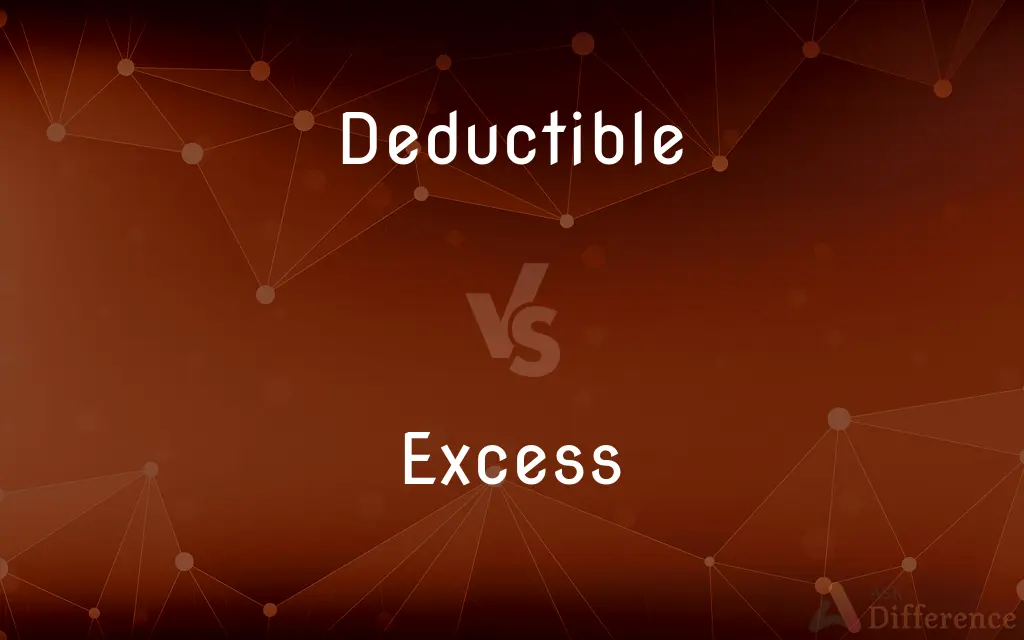Deductible vs. Excess — What's the Difference?
By Fiza Rafique & Urooj Arif — Updated on March 22, 2024
A deductible is amount paid out of pocket by the policyholder before an insurance company covers expenses, while excess is similar concept primarily used in UK and Australian insurance, referring to the first portion of a claim not covered by the insure.

Difference Between Deductible and Excess
Table of Contents
ADVERTISEMENT
Key Differences
A deductible in insurance terms refers to the amount that a policyholder must pay out of their own pocket before the insurance coverage kicks in for a claim. This concept is widely used in various types of insurance policies in the United States, including health, auto, and homeowners insurance. It serves as a means of sharing risk between the insurer and the insured. On the other hand, excess, a term more commonly used in UK, Australian, and other Commonwealth insurance markets, serves a similar purpose. It's the amount that the insured must contribute towards any claim, thereby reducing the number of small claims and deterring from risky behavior.
When it comes to auto insurance, a deductible is the amount you agree to pay towards repair costs before the insurance company covers the remainder. For instance, if you have a $500 deductible and incur $2,000 in repair costs from an accident, you would pay $500 and your insurer would pay $1,500. Conversely, excess in an auto insurance context works the same way but can sometimes be adjusted to lower the premium. Higher excess typically results in a lower premium, as it decreases the likelihood of small claims.
In health insurance, a deductible is an annual amount that a policyholder must spend out of pocket on eligible healthcare services before the insurance plan starts to pay. After meeting the deductible, the insured may still be responsible for coinsurance or copayments. Meanwhile, the concept of excess isn't as prevalent in health insurance outside of the United States but can be found in some private healthcare plans in the UK and Australia, often as a means to reduce the premium cost.
For homeowners insurance, the deductible might be a fixed amount or a percentage of the home's insured value. This deductible applies to claims for damage to the home or personal property. In contrast, excess in a home insurance policy in the UK or Australia functions in the same way, influencing the claim process by determining the initial amount not covered by the insurer.
In terms of policy structure, the deductible is a crucial part of the insurance contract in the US, clearly outlined in the policy documents and affecting the premium directly. A higher deductible generally leads to a lower premium. Similarly, the excess amount is specified in insurance policies in the UK and Australia, offering policyholders some flexibility in adjusting their coverage and premium costs.
ADVERTISEMENT
Comparison Chart
Definition
Amount paid by the policyholder before insurance coverage begins.
Amount contributed by the insured towards a claim.
Common Use
Predominantly in the US insurance market.
Primarily in UK, Australian, and other Commonwealth markets.
Impact on Premium
Higher deductible usually means lower premium.
Higher excess can lead to a lower premium.
Types of Insurance
Health, auto, homeowners, among others.
Similar types but terminology and details may vary.
Purpose
To share risk and discourage small claims.
Similar purpose, to deter minor claims and share risk.
Annual Accumulation
Often in health insurance, deductibles reset annually.
Excess may not always reset annually, depending on the policy.
Adjustment Flexibility
Some policies allow choosing the deductible amount.
Excess level can often be adjusted in the policy.
Effect on Claims Process
Policyholder pays deductible amount directly on claims.
Insured contributes the excess part of any claim.
Compare with Definitions
Deductible
An amount paid by a policyholder before insurance coverage.
The policy had a $1,000 deductible for any damage claims.
Excess
First part of a claim not covered by insurance in the UK/Australia.
The car insurance policy had a $300 excess for any damage.
Deductible
Risk-sharing mechanism in insurance policies.
Choosing a higher deductible can lower your monthly insurance premiums.
Excess
Policyholder's contribution to a claim.
For every claim, the policyholder must cover the excess amount.
Deductible
Out-of-pocket expense before insurer's payment.
She had to pay a deductible before her health insurance covered the surgery costs.
Excess
Amount that reduces the premium when increased.
Opting for a higher excess reduced her insurance premium.
Deductible
Direct payment towards repair or medical bills.
After the car accident, he paid the $500 deductible for the repairs.
Excess
Often adjustable in policy terms.
He chose a higher excess to decrease his annual insurance costs.
Deductible
Annual amount in health insurance.
His annual deductible for the health plan was $2,500.
Excess
Mechanism to deter small claims.
The excess is in place to prevent numerous minor insurance claims.
Deductible
In an insurance policy, the deductible is the amount paid out of pocket by the policy holder before an insurance provider will pay any expenses. In general usage, the term deductible may be used to describe one of several types of clauses that are used by insurance companies as a threshold for policy payments.
Excess
The state of exceeding what is normal or sufficient
Rains that filled the reservoirs to excess.
Deductible
That can be deducted, especially with respect to income taxes
Deductible expenses.
Excess
An amount or quantity beyond what is normal or sufficient; a surplus
Sold most of the stoves and put the excess in the warehouse.
Deductible
Something, such as an expense, that can be deducted, as for income-tax purposes.
Excess
The amount or degree by which one quantity exceeds another
Profit is the excess of sales over costs.
Deductible
A clause in an insurance policy that exempts the insurer from paying an initial specified amount in the event that the insured sustains a loss or must pay for services otherwise covered under the policy.
Excess
Intemperance; overindulgence
Drank to excess.
Deductible
The specified amount that must be paid by the holder of such a policy.
Excess
A behavior or action that exceeds proper or lawful bounds
Tried to avoid financial excesses such as buying expensive clothes.
Deductible
Eligible to be deducted.
Excess
Being more than is usual, required, or permitted
Skimming off the excess fat.
Deductible
An amount of expenses that must be paid out of pocket before an insurer will pay further expenses.
Excess
To eliminate the job or position of
Teachers who were excessed during the downturn.
Deductible
Capable of being deducted, taken away, or withdrawn.
Not one found honestly deductibleFrom any use that pleased him.
Excess
The state of surpassing or going beyond a limit; the state of being beyond sufficiency, necessity, or duty; more than what is usual or proper.
The excess of heavy water was given away to the neighbouring country.
Deductible
Deducible; consequential.
Excess
The degree or amount by which one thing or number exceeds another; remainder.
The difference between two numbers is the excess of one over the other.
Deductible
(taxes) an amount that can be deducted (especially for the purposes of calculating income tax)
Excess
An act of eating or drinking more than enough.
Deductible
A clause in an insurance policy that relieves the insurer of responsibility to pay the initial loss up to a stated amount
Excess
(geometry) Spherical excess, the amount by which the sum of the three angles of a spherical triangle exceeds two right angles. The spherical excess is proportional to the area of the triangle.
Deductible
Acceptable as a deduction (especially as a tax deduction)
Excess
A condition on an insurance policy by which the insured pays for a part of the claim.
Excess
More than is normal, necessary or specified.
Excess
To declare (an employee) surplus to requirements, such that he or she might not be given work.
Excess
An undue indulgence of the appetite; transgression of proper moderation in natural gratifications; intemperance; dissipation.
Be not drunk with wine, wherein is excess.
Thy desire . . . leads to no excessThat reaches blame.
Excess
The degree or amount by which one thing or number exceeds another; remainder; as, the difference between two numbers is the excess of one over the other.
Excess
A quantity much larger than is needed
Excess
Immoderation as a consequence of going beyond sufficient or permitted limits
Excess
The state of being more than full
Excess
Excessive indulgence;
The child was spoiled by overindulgence
Common Curiosities
Is excess applicable in liability claims?
Excess typically applies to claims on your own policy, not to liability claims made against you.
Do deductibles apply to every type of insurance claim?
Deductibles apply to most types of insurance claims, but specifics can vary by policy and type of insurance.
Can you negotiate the excess amount?
Some insurance policies allow you to adjust the excess amount, which can affect your premium and coverage terms.
How do deductibles work in health insurance?
You pay for health services up to the deductible amount before insurance starts covering costs, though some services might be covered before meeting the deductible.
What happens if you can't pay the deductible?
If you can't pay the deductible, your insurance company may not cover the claim, leaving you responsible for the full amount.
What's the difference between compulsory and voluntary excess?
Compulsory excess is set by the insurer, while voluntary excess is an additional amount you agree to pay, which can lower premiums.
Does the deductible apply to each claim or annually?
In health insurance, it's usually annual, while in other types it may apply to each claim.
What is a zero-excess policy?
It's an insurance policy where the insured doesn't have to pay any excess amount for a claim.
How does a deductible affect insurance premiums?
Generally, a higher deductible leads to lower premiums, as it reduces the insurer's risk.
Can deductibles and excess be refunded?
Typically, they are not refunded unless specified in the policy or if the claim is recovered from a third party.
Are there any insurance policies without deductibles or excess?
Some policies may not have deductibles or excess, but these often come with higher premiums.
How do I choose the right deductible or excess amount?
Consider your financial situation and risk tolerance to balance between affordable premiums and out-of-pocket costs.
Is it better to have a high deductible or high excess?
It depends on your financial ability to cover out-of-pocket expenses and your desire to lower premiums.
Share Your Discovery

Previous Comparison
Chemical vs. Reagent
Next Comparison
Cold vs. FrigidAuthor Spotlight
Written by
Fiza RafiqueFiza Rafique is a skilled content writer at AskDifference.com, where she meticulously refines and enhances written pieces. Drawing from her vast editorial expertise, Fiza ensures clarity, accuracy, and precision in every article. Passionate about language, she continually seeks to elevate the quality of content for readers worldwide.
Co-written by
Urooj ArifUrooj is a skilled content writer at Ask Difference, known for her exceptional ability to simplify complex topics into engaging and informative content. With a passion for research and a flair for clear, concise writing, she consistently delivers articles that resonate with our diverse audience.















































